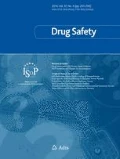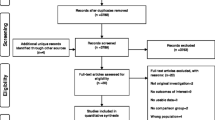Abstract
Introduction: Although relatively safe, both NSAIDs and ACE inhibitors can cause renal dysfunction in patients with compromised renal function. Case reports indicate that the combined use of ACE inhibitors and NSAIDs increases the risk of renal dysfunction. It is not known how often and when renal dysfunction occurs in patients using a combination of ACE inhibitors and NSAIDs.
Objective: The objective of the study was to investigate the effects of NSAIDs on the incidence of hospitalisations due to renal dysfunction in patients treated with ACE inhibitors.
Study Design: Case-control study nested within a cohort of users of ACE inhibitors.
Participants: All participants had at least two consecutive prescriptions for an ACE inhibitor. One hundred and forty-four cases were admitted to hospital for renal insufficiency during use of ACE inhibitors. There were 1189 randomly sampled control patients who did not have any hospital admission for renal dysfunction during use of ACE inhibitors.
Main Outcome Measures: The risk for hospitalisation for renal dysfunction associated with exposure to NSAIDs in patients receiving ACE inhibitors was expressed as odds ratios (OR).
Results: Of 144 cases, a total of 32 (22.2%) received NSAIDs in the 90 days before hospital admission for renal dysfunction. Recent start (<90 days) of an NSAID was associated with an increased risk of admission for renal dysfunction (adjusted OR 2.2; 95% CI 1.1–4.5). The increased risk was most pronounced in patients aged >70 years (adjusted OR 2.7; 95% CI 1.0–7.2). For patients who started NSAIDs and were dispensed at least three prescriptions in the 90 days preceding hospitalisation an adjusted OR of 7.1 (95% CI 1.8–28.7) was observed.
Conclusions: This study strongly suggests an increased risk for hospitalisation for renal insufficiency in patients receiving ACE inhibitors who start using NSAIDs. Elderly patients receiving several prescriptions for NSAIDs in a short period of time are particularly at risk. Renal function should be closely monitored in these patients.


Similar content being viewed by others
References
Dietz R, Nagel F, Osterziel KJ. Angiotensin-converting enzyme inhibitors and renal function in heart failure. Am J Cardiol 1992; 70: 119C–25C
Bakris GL, Weir MR. Angiotensin-converting enzyme inhibitor-associated elevations in serum creatinine: is this a cause for concern? Arch Intern Med 2000; 160: 685–93
Kalra PA, Kumwenda M, MacDowall P, et al. Questionnaire study and audit of use of angiotensin converting enzyme inhibitor and monitoring in general practice: the need for guidelines to prevent renal failure. BMJ 1999; 318: 234–7
Rexrode KM, Buring JE, Glynn RJ, et al. Analgesic use and renal function in men. JAMA 2001; 286: 315–21
Perez Gutthann S, Garcia Rodriguez LA, Raiford DS, et al. Nonsteroidal anti-inflammatory drugs and the risk of hospitalisation for acute renal failure. Arch Intern Med 1996; 156: 2433–9
Griffin MR, Yared A, Ray WA. Nonsteroidal antiinflammatory drugs and acute renal failure in elderly persons. Am J Epidemiol 2000; 151: 488–96
Krummel T, Dimitrov Y, Moulin B, et al. Drug points: acute renal failure induced by topical ketoprofen. BMJ 2000; 320: 93
Baraldi A, Ballestri M, Rapana R, et al. Acute renal failure of medical type in an elderly population. Nephrol Dial Transplant 1998; 13Suppl. 7: 25–9
Packer M. Interaction of prostaglandins and angiotensin II in the modulation of renal function in congestive heart failure. Circulation 1988; 77: I64–73
Whelton A. Nephrotoxicity of nonsteroidal anti-inflammatory drugs: physiologic foundations and clinical implications. Am J Med 1999; 106(5B): 13S–24S
World Health Organization. International classification of diseases, ninth revision, Clinical Modification (ICD-9). Geneva, Switzerland: World Health Organization, 1977
Stürmer T, Erb A, Keller F, et al. Determinants of impaired renal function with use of nonsteroidal anti-inflammatory drugs: the importance of half-life and other medications. Am J Med 2001; 111: 521–7
Ahmed A. Interaction between aspirin and angiotensin-converting enzyme inhibitors: should they be used together in older adults with heart failure? J Am Geriatr Soc 2002; 50: 1293–6
Lash JP, Gardner C. Effects of ageing and drugs on normal renal function. Coron Artery Dis 1997; 8: 489–94
Quan H, Parsons GA, Ghali WA. Validity of information on comorbidity derived from ICD-9 CCM administrative data. Med Care 2002; 40: 675–85
Brater DC. Effects of nonsteroidal anti-inflammatory drugs on renal function: focus on cyclooxygenase-2-selective inhibition. Am J Med 1999; 107(6A): 65S–70S
Rossat J, Maillard M, Nussberger J, et al. Renal effects of selective cyclooxygenase-2 inhibition in normotensive salt-depleted subjects. Clin Pharmacol Ther 1999; 66: 76–84
Graham MG. Acute renal failure related to high-dose celecoxib. Ann Intern Med 2001; 135: 69–70
Ahmad SR, Kortepeter C, Brinker A, et al. Renal failure associated with the use of celecoxib and rofecoxib. Drug Saf 2002; 25(7): 537–44
Noroian G, Clive D. Cyclo-oxygenase-2 inhibitors and the kidney: a case for caution. Drug Saf 2002; 25(3): 165–72
Acknowledgements
Marcel L. Bouvy designed the study, analysed and interpreted data and wrote the article. Eibert R. Heerdink designed the study, analysed and interpreted data and reviewed and commented on the article. Arno W. Hoes gave comments on the study design and reviewed and commented on the article. Hubert G.M. Leufkens gave comments on the study design and reviewed and commented on the article. All authors read, amended, and approved the final manuscript. We would like to thank S. Meijer, nephrologist, for his critical reading of the first draft of the article.
No sources of funding were used to assist in the preparation of this manuscript. The authors have no potential conflicts of interest that are directly relevant to the content of this manuscript.
Author information
Authors and Affiliations
Corresponding author
Rights and permissions
About this article
Cite this article
Bouvy, M.L., Heerdink, E.R., Hoes, A.W. et al. Effects of NSAIDs on the Incidence of Hospitalisations for Renal Dysfunction in Users of ACE Inhibitors. Drug-Safety 26, 983–989 (2003). https://doi.org/10.2165/00002018-200326130-00006
Published:
Issue Date:
DOI: https://doi.org/10.2165/00002018-200326130-00006




